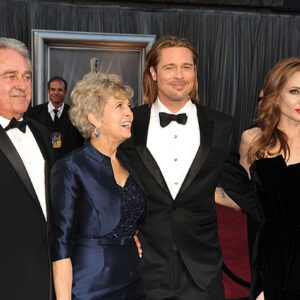Netflix’s popular new thriller was inspired by a disturbing real-life scandal involving London’s Metropolitan Police.
Netflix Keira Knightley stars in ‘Black Doves’
Just in time for the holidays, Netflix dropped a spy thriller that will have you suspiciously eyeing each member of your family. The winter-set (and surprisingly festive) Black Doves stars Keira Knightley as the mild-mannered wife of a high-powered politician who, when not attending events on her hubby’s arm, leads a secret life as a spy for the eponymous organization.
Though the series contains more than its fair share of astonishing twists and turns, Black Doves is inspired by a real scandal that unfolded in London over several decades, the fallout of which is ongoing. But series creator and director Joe Barton paired back many of the most horrific details of the true story, instead imbuing Black Doves with a surprisingly warm, witty, and jocular tone despite the material.
Read on to find out the disturbing true story that inspired Netflix’s Black Doves.
What is Black Doves about?
Ludovic Robert/Netflix Keira Knightley and Andrew Buchan
Black Doves follows Knightley’s Helen Webb, who on the surface appears to be nothing more than a doting wife to her husband, Wallace Webb (Andrew Buchan), one of Britain’s most prominent Conservative politicians who works for the state’s defense. But Helen is far more than the society grand dame she displays. She works for the spy agency Black Doves, which is staffed entirely by women and led by Mrs. Reed (Sarah Lancashire).
Helen is also engaging in an affair with fellow politico Jason (Andrew Koji). After Jason is shot and killed in what appears to be a targeted assassination, Mrs. Reed enlists the help of shady fixer and hitman Sam Young (Ben Whishaw) — who happens to be one of Helen’s few friends — to protect her. Is the threat coming from external forces, or from within the Black Doves itself?
How does the Black Doves organization operate in the show?
Netflix Keira Knightley
As mentioned, the Black Doves are a female-exclusive team of spies who are essentially in it for the money. They possess no loyalty to the U.K. nor any other nation. They answer only to whomever is paying them to do to whatever dirty work needs to be done. According to Netflix, the agency is “ultimately looking to make the most money possible by selling secrets to the highest bidder, good or bad.”
Helen, who previously went by the name Daisy Bradshaw, was recruited into the organization by Mrs. Reed, who detected a tradecraft talent in her. Together, they head up the Black Doves London offices.
The Black Doves is so secretive that even Helen isn’t entirely sure who else works for the organization…or if the organization is working against her. Around the midpoint of the first season, Helen spots Dani (Agnes O’Casey), who is revealed to be a Black Doves operative monitoring Helen’s activities under the instruction of Mrs. Reed.
Is Black Doves based on a true story?
Netflix Ben Whishaw
Barton told Radio Times that Black Doves was inspired by Britain’s spy cop scandal, but it’s not explicitly based on those events. He told the outlet that the reality was “really horrific” and “much darker than” anything in Black Doves — and he’s absolutely right.
“I had been reading about those spy cops, those guys, and [how] they infiltrated that environmental group and ended up having children with [some people],” Morton explained. “That idea, that duplicitousness of having a pretend marriage lasting years and years and years and then it’s disappeared. That was really part of, I think, the inspiration for it as well.”
The creator continued: “I’d had a couple of different ideas floating around my head, like I’d been wanting to do something ‘spy-esque.’ I had this idea about these two characters that were friends and I had a few different scenes in my head.”
Though the true story behind the spy cops scandal bears little resemblance to Black Doves, the bizarre, decades-spanning deceptions served as direct inspiration.
What is Britain’s ‘spy cop scandal’?
Ken McKay/ITV/Shutterstock Activist Helen Steele, one of the inspirations for Knightley’s character
The “spy cops” were a top-secret subsection of London’s Metropolitan police force. The objective of the spy cop division was to join political advocacy organizations — nominally progressive or left-leaning causes — and act as like-minded activists, all the while feeding the information back to their superiors regarding the groups’ plans. The Guardian reported that, throughout its 25-year lifespan, the organization infiltrated over 1,000 organizations.
At least five male spy cops spent years undercover, some even going so far as having children with women from groups on which they were spying on in a bid to deepen their cover. Often, this was known of and even encouraged by their bosses. The spy cops division operated for decades before it was disbanded in 2011, but the fallout continues. The officers who were embroiled in the matter were Bob Lambert; Jim Boyling; Mark Jenner; John Dines; and Mark Kennedy, who was the first officer publicly identified as part of the scandal.
Lambert fathered a child with an animal rights activist identified in public records only as “Jacqui,” who discovered the truth of their relationship more than 20 years after the birth. Jacqui said the revelation “absolutely ruined” her life, as she genuinely believed Lambert was her soulmate. Lambert later admitted he knew Jacqui would never have consented to their relationship if she knew his true identity.
Dines infiltrated London Greenpeace, which at the time was run by noted activist Helen Steel. She would eventually become a key figure in the investigation, which is known as the Undercover Policing Inquiry. Steel is one of two women to speak publicly about the trauma of the officers’ deception. Morton’s reference to Radio Times about “that environmental group” implies Knightley’s character was inspired in part by Steel.
Steel and Dines met in the late ‘80s and began dating in the ‘90s, during which time they lived together and discussed starting a family, according to The Telegraph. Throughout their two-year romantic relationship, she knew him by a false name — that of a deceased infant. Then, one day, Dines abandoned Steel and fled the country, implying that he had suffered some sort of psychological break. Steel spent years searching for him, per The Guardian, during which time she discovered his true identity. Finally, in 2016, she tracked him down and he apologized to her, BBC reported.
What has been the fallout of the spy cops scandal?
Netflix Andrew Koji in ‘Black Doves’
In 2015, Steel was one of seven women to whom the London Metropolitan Police issued “an unreserved apology” (via BBC), and one of eight to sue the department. The plaintiffs were eventually awarded a combined settlement estimated to be around £3 million, The Telegraph reported.
“Thanks in large part to the courage and tenacity of these women…it has become apparent that some officers entered into long-term intimate sexual relationships which were abusive, deceitful, manipulative, and wrong,” then-Assistant Commissioner Martin Hewitt said at the time. “These [relationships] should never have happened. They were a gross violation of personal dignity and integrity.” He reiterated that the relationships were “wrong” and added that any officers found to have had relationships with informants would face prosecution.
Steele and the other women involved responded with their own statement: “We have worked together on this painful and deeply personal legal case in order to expose the serious and systemic abuse of power by undercover police officers and their managers. Although no amount of ‘sorry’ or financial compensation can make up for what we and others have endured, we are pleased the police have been forced to acknowledge the abusive nature of these relationships and that they should never happen.” They added that what had occurred amounted to “institutional sexism,” since many of the spy cops’ superiors were aware of and even encouraged their romantic entanglements, according to BBC.
The Undercover Policing Inquiry is ongoing, examining the conduct of at least 139 officers between 1968 and 2010. Guernsey Press reported that the inquiry has so far cost the U.K. government an estimated £88 million as of September; it’s expected to file its final report in 2026.
Black Doves is streaming on Netflix.

